Queens Park Rangers F.C. facts for kids
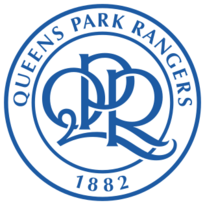 |
||
| Full name | Queens Park Rangers Football Club | |
|---|---|---|
| Nickname(s) | The Rs, Rangers, The Hoops, SuperHoops | |
| Short name | QPR | |
| Founded | 1882, as Christchurch Rangers | |
| Ground | MATRADE Loftus Road Stadium | |
| Capacity | 18,439 | |
| Owner |
|
|
| Chairman | Lee Hoos | |
| Head coach | Julien Stéphan | |
| League | Championship | |
| 2018–19 | Championship, 19th of 24 | |
|
|
||
Queens Park Rangers Football Club, often called QPR, is a professional football team from Shepherd's Bush, West London, England. The team plays in the EFL Championship, which is the second highest league in the English football system.
The club started as Christchurch Rangers in 1882. They got their current name after joining with St Judes Institute four years later. This happened near the Queen's Park and Kensal areas. QPR won the West London League in 1898–99. Then they joined the Southern and Western leagues, winning titles in both. During this time, they played in the FA Charity Shield final twice, in 1908 and 1912.
QPR joined the Football League in 1920. They played in the Third Division South until they won promotion as champions in 1947–48. The club was moved down a league in 1952. But they slowly got stronger under manager Alec Stock. This led to them winning the Third Division title. They also won their only major trophy, the League Cup, in the 1966–67 season.
After moving up from the Second Division in 1967–68, they were moved down after just one season in the top league. QPR won promotion again in 1972–73. They almost won the English league title in 1975–76, finishing just one point behind Liverpool. They were moved down again in 1979. But they reached the FA Cup final in 1982 while still in the second league. They lost to Tottenham Hotspur after a replay match.
QPR won another Second Division title in 1982–83. They were also runners-up in the 1986 League Cup final. They stayed in the top league for thirteen years. They were one of the first teams to be part of the Premier League in 1992. But they were moved down in 1996. After being moved down again in 2001, they earned promotion from the third league at the end of the 2003–04 season.
QPR won promotion as champions of the Championship in 2010–11. However, they were moved down from the Premier League after two seasons. They quickly earned promotion again through the play-offs in 2014. But they were moved down the next season. They have been in the Championship ever since.
QPR played at many different stadiums early on. They have played home matches at Loftus Road since 1917. This was only interrupted by two short times at the White City Stadium. They have rivalries with other clubs. Their biggest rivalry is the West London derby against Chelsea.
Contents
Club History
How QPR Started (1882-1920s)
The club was formed in 1886. This happened when a team called St Jude's (started in 1884) joined with Christchurch Rangers (started in 1882). The new team was named Queen's Park Rangers. Their official start date is considered 1882. This is the original founding date of Christchurch Rangers. The club's name came from most players living in the Queen's Park area of West London.
QPR became a professional team in 1889. The club joined the Southern Football League in 1899. In 1899–1900, they became well-known. They qualified for the first round of the FA Cup. They beat Wolverhampton Wanderers 1–0 on their home ground.
They first won the Southern Football League in 1907–08. As champions, they played in the first ever Charity Shield match. This was against the Football League champions Manchester United. QPR lost 4–0 in a replay. The first game ended 1–1. Both games were played at Stamford Bridge. QPR won the Southern League for a second time in 1911-12.
Rising Through the Ranks (1920s-1960s)
The club joined the Football League in 1920. This was when the Third Division was created. Most teams were from the Southern League. When the Third Division was split into North and South the next season, QPR was in the Third Division (South).
QPR played their home games in almost 20 different stadiums. This is a league record. They finally settled at Loftus Road in 1917. However, the team briefly tried to get bigger crowds. They played at the White City Stadium for two short periods. These were from 1931 to 1933, and during the 1962–63 season.
The club won promotion as champions of Division 3 South in the 1947–48 season. Dave Mangnall was the manager. The club played four seasons in the Second Division. They were moved down in 1951–52. Tony Ingham joined from Leeds United. He went on to play the most league games ever for QPR (519).
The club's most important manager, Alec Stock, arrived before the 1959–60 season. In the 1960–61 season, QPR had their biggest win. They beat Tranmere Rovers 9–2 in a Division 3 match. Stock, along with chairman Jim Gregory (who joined in the mid-1960s), helped change the club completely.
In 1966–67, QPR won the Division Three championship. They also became the first Third Division club to win the League Cup. This happened on March 4, 1967. They beat West Bromwich Albion 3–2. They came back after being two goals down. This was the club's first and only major trophy. It was also the first League Cup final held at Wembley Stadium. After winning promotion in 1968 to the top league for the first time, Rangers were moved down after just one season. They spent the next four years in Division Two.
The Golden Era (1970s)
Terry Venables joined from Spurs at the start of the 1969–70 season. Rodney Marsh was sold to Manchester City. During this time, new QPR stars appeared. These included Phil Parkes, Don Givens, Dave Thomas, and Stan Bowles. These new players joined talented players from QPR's own youth system. These included Dave Clement, Ian Gillard, Mick Leach, and Gerry Francis.
In 1972, QPR was promoted to Division One. This was the top league in English football. Jim Gregory was the manager.
In 1974, Dave Sexton became manager. In 1975–76, he led QPR to second place in the First Division. They missed winning the championship by only one point. Their team had seven England international players. After finishing their 42-game season, QPR was at the top of the league. They were one point ahead of Liverpool. Liverpool then beat Wolverhampton Wanderers to win the title. Wolves were moved down to the Second Division that same season. The late 1970s also saw some cup success. Rangers reached the semi-finals of the League Cup. In their first time playing in European football, they reached the quarter-finals of the UEFA Cup. They lost to AEK Athens on penalties. After Sexton left in 1977, the club eventually moved down to the Second Division in 1979.
Promotions, Relegations, and Cup Finals (1980s)
In 1980, Terry Venables became manager. In 1981, the club installed an artificial turf pitch. In 1982, QPR, still in the Second Division, reached the FA Cup final. This was the only time in the club's history. They played against the current champions, Tottenham Hotspur. Tottenham won 1–0 in a replay.
The next season, QPR won the Second Division championship. They returned to England's top football league. After finishing a good fifth place and qualifying for the UEFA Cup the next year, Venables left to manage Barcelona. In 1988, the club had a new chairman, 24-year-old Richard Thompson. Over the next seven years, many managers came and went at Loftus Road. The club often finished in the middle of the table and avoided being moved down. The most successful season during this time was 1987–88. QPR finished fifth. However, they could not play in the UEFA Cup. This was because English clubs were banned from European competitions after the Heysel Stadium disaster. They were also runners-up in the 1986 League Cup. They lost to Oxford United.
Premier League Years and Relegation (1990s)
Gerry Francis, a key player in the 1970s QPR team, became manager in the summer of 1991. He had been a successful manager with Bristol Rovers. In his first season, they finished in the middle of the league table. In the 1992–93 season, they were one of the first teams in the new Premier League. They finished fifth, as the top London club. Francis led QPR to one of their most famous wins. This was a 4–1 victory at Old Trafford on New Year's Day 1992.
In the middle of the 1994–95 season, Francis resigned. He quickly became manager of Tottenham Hotspur. Ray Wilkins took over as player-manager. Wilkins led QPR to an eighth-place finish in the Premiership. In July 1995, the club's top goalscorer, Les Ferdinand, was sold for a club record fee of £6 million to Newcastle United.
QPR struggled the next season. They were moved down at the end of the 1995–96 season. QPR then played in Division 1 until 2001. They had several managers, including club legend Gerry Francis for a second time. The team usually finished in the middle or lower half of the division.
Financial Challenges and New Owners (2000s)
After several years of struggling in the second league, QPR faced financial problems. In 2001, the club went into a special financial process. This meant they had money troubles. A difficult financial period followed. The club got out of this situation after receiving a large emergency loan. This loan continued to be a burden. The 2000–01 season was very bad. Francis resigned in early 2001. Former Rangers player Ian Holloway became manager. But he could not stop the club from being moved down to the third league at the end of the season. This was the first time since the 1960s.
After being moved down, Holloway built a team with several QPR fans in the squad. These included Kevin Gallen, Marc Bircham, and Richard Langley. Other important players were Danny Shittu, Gareth Ainsworth, and Clarke Carlisle. In their second season in the third league, the club reached the play-off final in Cardiff. They lost 0–1 to Cardiff City in extra time. The next season, QPR put their play-off sadness behind them. They returned to Division 1 as runners-up. They had a famous 3–1 win away at Hillsborough. About 7,000 Rangers fans traveled to see it.
Rangers struggled to play consistently well for the next two seasons. Holloway was then suspended. There were rumors he would leave for Leicester City. A series of poor results meant Holloway's replacements, Gary Waddock and later John Gregory (both former players), did not keep the manager job.
In the 2005–06 season, there were problems involving the directors and shareholders. In an unrelated sad event, QPR was affected by the death of youth team player Kiyan Prince on May 18, 2006. In August 2007, promising first-team player Ray Jones also died in a car crash.
Rangers continued to face growing financial pressure. In September 2007, it was announced that wealthy Formula One businessmen Flavio Briatore and Bernie Ecclestone bought the club. John Gregory's time as manager ended in October 2007. This was after many poor results left QPR at the bottom of the Championship. Luigi De Canio replaced him until the end of the 2007–08 season. More money was invested in early 2008. The club wanted to push for promotion to the Premier League within four years. This was based on better financial stability. On May 14, 2008, Iain Dowie was announced as the manager. He was to lead the effort to get Rangers back to the top league. However, on October 24, 2008, Dowie was fired after only 15 games.
On November 19, 2008, QPR named former Portugal midfielder Paulo Sousa as their new first team coach. However, on April 9, 2009, his contract was ended. This was because he reportedly shared private information without permission. On the same day, player/coach Gareth Ainsworth became player/caretaker manager for a second time. In June 2009, Jim Magilton was named the new manager of QPR. He led QPR to a good start to the 2009–10 season. But then their form dropped. Magilton left the club by agreement on December 16, 2009. Paul Hart and Mick Harford replaced them the next day.
Promotions and Relegations (2010s)
Less than a month after becoming manager, Paul Hart left QPR on January 14, 2010. The reasons for his departure were not stated.
On March 1, 2010, experienced Championship manager Neil Warnock joined Queens Park Rangers as manager. He signed a three-and-a-half-year deal. After helping the club avoid being moved down in the 10–11 season, Warnock built a team. It mostly had experienced Championship players. These included Shaun Derry, Clint Hill, and Paddy Kenny. Player Adel Taarabt, who had been on loan, was given a main role and made captain.
On April 30, 2011, QPR earned promotion to the Premier League. They won the Championship with a 2–0 win over Watford. An investigation by the FA about QPR's signing of Alejandro Faurlín threatened to take points from the team. This put their promotion at risk. The investigation finished on May 7, 2011. QPR was found to be at fault in two of seven charges. They received an £875,000 fine. However, no points were taken by the FA. QPR's promotion to the Premier League was confirmed.
After the club was promoted, Ecclestone and Briatore sold their shares to Malaysian billionaire and Air Asia owner Tony Fernandes. His arrival led to a lot of player signings on the last day of transfers. This was to make the QPR team stronger.
In January 2012, Fernandes fired Warnock. He appointed Mark Hughes as team manager. Hughes had a tough start at Loftus Road. But after five straight home wins, Hughes and QPR avoided being moved down. This was despite a dramatic 3–2 defeat at Manchester City on the last day of the season.
On November 23, 2012, Mark Hughes was fired. This was after a bad start to the 2012–13 season. The club had only four points in 12 games. They were at the bottom of the Premier League. This was despite a lot of money spent on new players during Hughes's time. A day later, Harry Redknapp was confirmed as the new manager. On April 28, 2013, in a 0–0 draw against Reading, QPR was moved down from the Premier League to the Championship. This happened with three games left in the season. They had been in the top league for two seasons.
During the 2013–14 season, QPR finished fourth in the Championship. They qualified for the play-offs. They beat Wigan Athletic in the semi-finals. In the final against favorites Derby County on May 24, 2014, QPR won 1–0. A goal by Bobby Zamora in the 90th minute sent them back to the Premier League right away.
After being promoted back to the Premier League, QPR had a difficult 2014–15 season. Harry Redknapp resigned in February after poor results. Chris Ramsey replaced him. The club finished last, with only 30 points. They were moved down to the Championship after only one season. After a bad start to the next season, Ramsey was fired in November 2015. Former manager Neil Warnock returned as temporary manager. On December 4, 2015, Jimmy Floyd Hasselbaink was appointed the club's new manager. Hasselbaink was fired on November 5, 2016, after just 11 months. Six days later, QPR brought back Ian Holloway. He had been in charge ten years before. Holloway's second time focused on bringing young players into the team. He gave first games to youth players Eberechi Eze and Ilias Chair. He also made other young players like Darnell Furlong, Ryan Manning, and Bright Osayi-Samuel important team members. Results were not consistent under Holloway. The club finished in the lower middle of the table in both seasons of his second time. Holloway left the club at the end of the 2017–18 season.
On May 17, 2018, QPR appointed former England manager Steve McClaren as manager. The team had a good first half of the season. They were as high as eighth by Christmas. But results quickly got worse after the new year. McClaren was fired in April 2019 after a 2–1 loss to Bolton.
On May 8, 2019, former Rangers and Brentford manager Mark Warburton was appointed as McClaren's replacement. He signed a two-year deal.
Recent Years (2020s)
The club continued to develop young talent. They focused on creating more players from their own youth system. They aimed for promotion in each of Warburton's three seasons. However, they did not reach the play-offs in any of these seasons. Warburton's contract was not renewed after the 2021–22 season. A disappointing end to the season saw Rangers drop out of the play-offs. They had been in the play-off spots for most of the season. They finished 11th.
Before the 2022–23 season, former Aston Villa assistant manager Michael Beale was appointed manager. He signed a three-year deal on June 1, 2022. Two weeks after saying he would stay loyal to the club, Beale was approached by Scottish club Rangers. They appointed him manager in November 2022. On December 11, 2022, former Blackpool manager Neil Critchley was named QPR manager. He signed a three-and-a-half-year deal. However, after a very bad run of results, Neil Critchley was fired after just 46 days. He left with the lowest win percentage of any manager in their history. He won one match out of twelve. He was replaced by former player Gareth Ainsworth. Ainsworth joined from Wycombe Wanderers.
After a poor start to the 2023–24 season, Gareth Ainsworth was fired. The club was in 23rd place in the Championship. He was replaced by Martí Cifuentes. The team spent much of the season in the relegation zone. But Cifuentes turned their luck around. He guided them to stay in the Championship. This was with a 4–0 home win over Leeds United, who were hoping for promotion. In April 2025, Cifuentes was put on leave. Kevin Betsy and Xavi Calm took charge of the final game of the season. Cifuentes left the club in June 2025. He was replaced by Julien Stéphan.
Team Kits
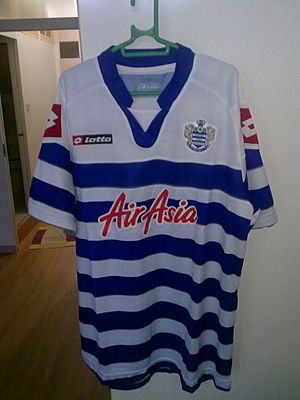
| Time Period | Kit Maker | Shirt Sponsor |
|---|---|---|
| 1974–1975 | Admiral | None |
| 1975–1976 | Umbro | |
| 1976–1983 | Adidas | |
| 1983–1986 | Guinness | |
| 1986–1987 | Blue*Star | |
| 1987–1989 | Holland and Fly KLM | |
| 1989–1990 | Influence | |
| 1990 Aug – 1990 Dec | Influence Leisure | |
| 1990 Dec – 1991 | Holland and Fly KLM | |
| 1991–1992 | Brooks | Brooks |
| 1992–1993 | Clubhouse | Classic FM |
| 1993–1994 | CSF | |
| 1994–1995 | Compaq | |
| 1995–1996 | View From | |
| 1996–1997 | Ericsson | |
| 1997–2001 | Le Coq Sportif | |
| 2001–2003 | JD Sports | |
| 2003–2006 | Binatone | |
| 2006–2008 | Cargiant.co.uk | |
| 2008–2011 | Lotto | GulfAir.com |
| 2011–2012 | Malaysia Airlines (home) and AirAsia (away and third) | |
| 2012–2014 | AirAsia | |
| 2014–2016 | Nike | |
| 2016–2017 | Dryworld | Smarkets |
| 2017–2020 | Erreà | Royal Panda |
| 2020 | BetUK.com | |
| 2020–2021 | Football Index | |
| 2021 | Senate Bespoke | |
| 2021 | Ashville Holdings | |
| 2022–2024 | Convivia | |
| 2024– | CopyBet |
Home Stadiums
Queens Park Rangers has moved around a lot in its history. The places they played before 1886 are not known. They were likely in the Queen's Park area of London. After that, the club played at 15 different places in west and north-west London. But since joining the Football League in 1920, they have only played at two main stadiums. These are Loftus Road (also known as Kiyan Prince Foundation Stadium for a few years) and White City Stadium.
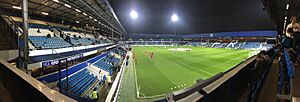
- Welford Fields (1886–1888)
- London Scottish Ground (1888–1889)
- Home Farm (1888–1889)
- Kensal Green (1888–1889)
- Gun Club (1888–1889)
- Wormwood Scrubs (1888–1889)
- Kilburn Cricket Ground (1888–1889)
- Barn Elms (1891)
- Kensal Rise Athletic Ground (1899–1901)
- Latimer Road (1901–1902)
- Kensal Rise Athletic Ground (1902–1904)
- Royal Agricultural Society showgrounds (1904–1907)
- Park Royal Ground (1907–1917)
- Loftus Road (1917–1931)
- White City Stadium (1931–1933)
- Loftus Road (1933–1962)
- White City Stadium (1962–1963)
- Loftus Road (1963 –present)
There were plans to build a new 40,000-seat stadium called New Queens Park. However, these plans were put on hold. The club is now looking to build a stadium with 30,000 seats at the Linford Christie Stadium site. The club says this would bring a big financial boost to the local area. But the local council had some doubts at first.
QPR has also been involved in a long legal fight. This was to build a training ground at Warren Farm in Southall. In November 2018, judges rejected the final appeal from local people against the plans. This cleared the way for work to begin. However, the club officially stopped plans for a training ground at Warren Farm on May 6, 2020. They replaced it with a plan to make the site a community sports center. The club signed a secret agreement about another site. On July 6, it was announced that the club officially got the land for Heston Sports Ground from Imperial College. They plan to develop it into a training ground for the club. Discussions are ongoing with Hounslow Council.
On March 31, 2021, the club got permission to redevelop Heston Sports Ground. It will become a modern training ground. This was approved by the Secretary of State on September 27, 2021. Final planning permission from Hounslow Council was also given. Construction officially began on October 1, 2021. The club aims to move into the £20 million facility by the start of the 2022–23 season. The final completion date is the 2023–24 season.
In June 2019, the club gave the stadium naming rights to The Kiyan Prince Foundation. This is a local charity started by the father of Kiyan Prince. Prince was a former QPR youth player who sadly died in 2006. On May 25, 2022, the club announced that the stadium name would go back to Loftus Road for the 2022–23 season.
Fans and Rivalries
QPR has a loyal group of fans. They come from across west London and nearby areas. The club has fan clubs around the world. These include groups in the Republic of Ireland, the US, Australia, Norway, and Sierra Leone. The club's longest-running fan magazine is A Kick Up The R's. It has been published every month since August 1987. It is sold at both home and away matches.
QPR has long-standing rivalries with several other clubs. This is because of the club's location in West London. The most important rivalry is the West London derby against Chelsea. Other rivalries include Brentford, Cardiff City, Millwall, Fulham, and Luton.
The loudest QPR fans at home games are in the Q, P, and R Blocks. Fans often stand there and start the chants. The rest of the fans in the Loft and Stanley Bowles Stands then join in.
Songs and Chants
When the club won the League Cup final in 1967, they released a song. It was called "QPR – The Greatest." It was about their famous win. Rangers winger Mark Lazarus sang on it.
When the team comes onto the pitch at Loftus Road, and when they score, the song Papa's Got a Brand New Pigbag by the band Pigbag is played. Fans shout "HOOPS" after the fifth trumpet sound.
At matches, Rangers fans sing chants like "Come On You Rs," "We are the pride of West London, The Blue & The White," "Captain Jack," and "We Are the Rangers Boys."
Famous Supporters
QPR has many famous supporters. These include comedian Bill Bailey. Musicians like Pete Doherty (who used to write a QPR fan magazine called All Quiet on the Western Avenue), Ian Gillan of Deep Purple, Robert Smith of The Cure, Mick Jones of The Clash, and Glen Matlock of The Sex Pistols are also fans. Politicians Michael Gove and Alan Johnson support the team. Actor Martin Clunes, documentary-maker Louis Theroux, and former England cricketer Alex Tudor are also QPR fans.
Club Records and Statistics
- Highest attendance: 35,353 vs Leeds United, April 27, 1974, Division 1
- Highest all-seated attendance: 19,002 vs Manchester City, November 6, 1999, Division 1
- Biggest league win: 9–2 vs Tranmere Rovers, December 3, 1960, Division 3
- Biggest league loss: 1–8 vs Manchester United March 19, 1969, Division 1
- Biggest home defeat: 0–6 vs Newcastle United, September 13, 2016
- Most capped player: Alan McDonald, 52 games for Northern Ireland
- Most league appearances: Tony Ingham, 519 games, 1950–63
- Oldest player: Ray Wilkins, 39 years and 352 days, September 1, 1996, Division 1
- Youngest player: Frank Sibley, 15 years and 275 days
- Most league goals in a season: George Goddard, 37 goals, Division 3 South, 1929–30.
- Most goals in a season: Rodney Marsh, 44 goals (30 League, 3 FA Cup, 11 League Cup) 1966–67
- Most league goals in total: George Goddard, 174 goals, 1926–34.
- Most goals in total: George Goddard, 186 goals, 1926–34
- Record transfer fee received: £19.5 million from Crystal Palace for Ebere Eze, August 2020
- Record transfer fee paid: £12.5 million to Anzhi Makhachkala for Christopher Samba, January 2013
QPR in European Competitions
QPR first played in European competitions in the 1976–77 UEFA Cup. They reached the quarter-finals. They were knocked out by AEK Athens after a penalty shootout. The club also played in the 1984–85 UEFA Cup. But they were knocked out in the second round by Partizan Belgrade.
Players
First Team Squad
|
|
Players on Loan
|
Development Squads
Development Squad
|
|
Under-18s Squad
|
|
Famous Former Players
Retired Jersey Numbers
|
QPR Fans' Player of the Year
|
|
|
Source: Myfootballfacts.com Queens Park Rangers FC 'All Time XI'Queens Park Rangers fans voted for their best all-time squad in 2008.
Club ManagementCurrent Staff
Football Staff
Board of Directors and Senior Management
Managerial HistoryThe last ten permanent managers of QPR:
Club Ownership and MoneyBritish business person Chris Wright bought QPR in 1996. He eventually gave up his main share in 2001. He had put £20 million into Loftus Road over five years. The club faced financial difficulties and went into a special financial process that year. After long talks in December 2004, Wright agreed to sell his remaining 15% share. Half of the money paid to him was given back to QPR. This was a lot of money for the club. After several years of financial problems, QPR was bought by Formula One leaders Bernie Ecclestone and Flavio Briatore. This £14 million takeover happened in August 2007. They spent £690,000 to get a 69% main share in the club. This was from a group led by Italian football agent Antonio Caliendo. Ecclestone spent £150,000 for his 15%. Briatore bought 54% for £540,000 through a company. Briatore and Ecclestone also promised £5 million in loans to help buy players. They also covered £13 million of debt. Their total commitment to the club was about £20 million. At the time of purchase, the other 31% of shareholders did not accept the offer of 1p per share. On December 20, 2007, it was announced that the family of billionaire Lakshmi Mittal bought a 20% share in the club from Flavio Briatore. The price for this 20% share was only £200,000. As part of this investment, Lakshmi Mittal's son-in-law Amit Bhatia joined the board of directors. Despite QPR's difficult financial situation in 2007–08, the new owners were very wealthy. This led to talk that QPR would get a lot more money from them. People compared it to wealthy London clubs like Chelsea and Fulham. However, not much more money was given to the club. Most player transfers involved temporary loans or free transfers. 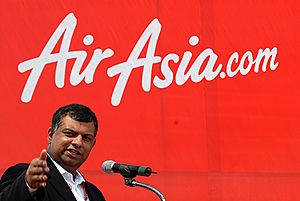
Tony Fernandes was the chairman of Queens Park Rangers
Flavio Briatore's future as QPR chairman was questioned in September 2009. This was after he left the Renault F1 team due to allegations of cheating in races. The Football League board discussed this on October 8, 2009. They said they would wait for Briatore's answers before saying more. Meanwhile, the club continued to lose money. Briatore sold his 62% share to Ecclestone in December 2010. Briatore might have kept the right to buy it back if Ecclestone sold it. He first stepped back from running the club daily. Amit Bhatia and Ishan Saksena took over. However, Briatore slowly became more involved again. Disagreements between Briatore and Bhatia and Saksena led to both Bhatia and Saksena leaving QPR in May 2011. On August 18, 2011, Malaysian businessman Tony Fernandes was announced as the main owner. He bought Ecclestone's 66% share for about £35 million. The Mittal Family kept their 33% share. Amit Bhatia returned as vice-chairman. Phillip Beard became the new chief executive of the club. Gianni Paladini was removed as club chairman. Briatore and Ecclestone were no longer involved with the club. They had no board roles or other financial ties. Bhatia also explained that the club's debt, which was secured by the stadium, had been "bought off" by the new owners. This means new loans replaced the old ones. The current debt is thought to be a loan from the owners to the club, with no interest. On August 15, 2018, Bhatia became chairman of the club. On July 10, 2023, Fernandes announced that he was selling all his shares in the club. He wanted to focus on rebuilding his airline business. Club AchievementsNote: the leagues and divisions of English football have changed over time. Here, they are grouped by their level in the English football league system when they were won. This helps compare the achievements easily. Source: League Titles
Cup Wins
Other Trophies
Images for kidsSee also
|


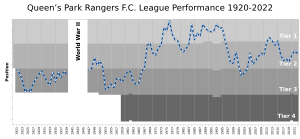
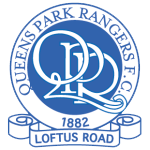
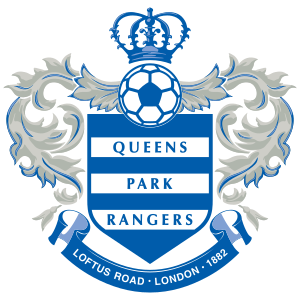
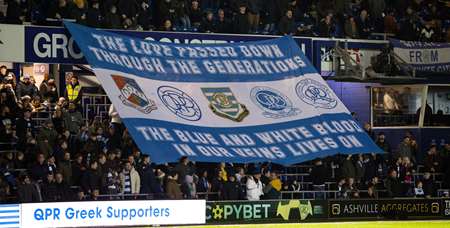
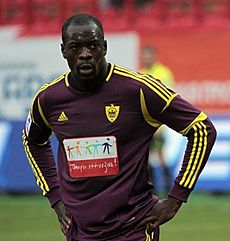
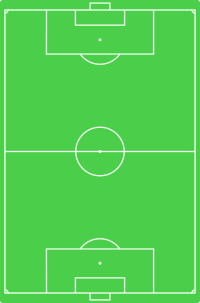

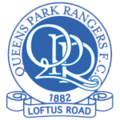
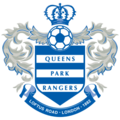


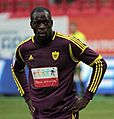

 In Spanish:
In Spanish: